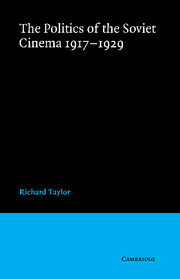Book contents
- Frontmatter
- Contents
- Preface
- Acknowledgements
- Note on transliteration
- Abbreviations
- 1 The pre-history of the Soviet cinema
- 2 The Bolsheviks, propaganda and the cinema
- 3 Revolution and Civil War
- 4 The disorganisation of organisation: the early twenties
- 5 The organisation of disorganisation: the later twenties
- 6 The Party takes control
- 7 Theory and film
- 8 Conclusions
- Notes
- Bibliography
- Index
7 - Theory and film
Published online by Cambridge University Press: 07 October 2011
- Frontmatter
- Contents
- Preface
- Acknowledgements
- Note on transliteration
- Abbreviations
- 1 The pre-history of the Soviet cinema
- 2 The Bolsheviks, propaganda and the cinema
- 3 Revolution and Civil War
- 4 The disorganisation of organisation: the early twenties
- 5 The organisation of disorganisation: the later twenties
- 6 The Party takes control
- 7 Theory and film
- 8 Conclusions
- Notes
- Bibliography
- Index
Summary
The cinema's misfortune is that there are very few literate people in it.
Soviet film journal, 1922.By the end of the 1920s discussions within the Soviet cinema were being conducted primarily, if not yet exclusively, in Party terminology. This was a new phenomenon. Although the arguments about the cinema's rôle in relation to the theatre and about its function as the art form of the machine age had been put in political terms, against the background of a belief in the cinema as the art form of the Revolution itself, these terms had not previously been imposed on the cinema world from outside. The views expressed in these polemics reflected a genuine and spontaneous desire to assist the revolutionary cause and the construction of the new society.
Lenin had laid great stress on the particular importance of the newsreel and documentary film for Bolshevik propaganda. In November 1920 he suggested that Soviet newsreels should concentrate on three themes: the welfare of mothers and children, the Wrangel front and ‘palaces transformed into children's homes’. By selecting and emphasising these issues Bolshevik propaganda would make the maximum impact on its audience and the meagre resources available would thus be used to optimum effect.
Documentary film makers were of course to seize on the encouragement that Lenin had given them to claim for themselves the legitimacy thus bestowed upon the art form of the Revolution. The leading exponents of the documentary school of film-making were Dziga Vertov and his Kinoglaz or Cine-Eye movement.
- Type
- Chapter
- Information
- The Politics of the Soviet Cinema 1917–1929 , pp. 124 - 151Publisher: Cambridge University PressPrint publication year: 1979



